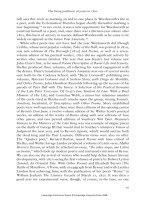The cambridge companion to british roman 41
Bạn đang xem bản rút gọn của tài liệu. Xem và tải ngay bản đầy đủ của tài liệu tại đây (39.29 KB, 1 trang )
The living pantheon of poets in 1820
Gill sees this work as marking an end to one phase in Wordsworth’s life as
a poet, with the Ecclesiastical Sketches begun shortly thereafter marking a
new beginning;14 in any event, it was a new opportunity for Wordsworth to
construct himself as a poet, and, since there was a thirteen-year silence after
1822, this burst of activity in essence defined Wordsworth as he came to be
widely recognized as the future Poet Laureate.15
While other poets may not have had the year Wordsworth did (though
Crabbe, whose most popular volume, Tales of the Hall, was printed in 1819,
saw new editions of The Borough [1810] and Poems, as well as a sevenvolume edition of his poetical works), 1820 did see significant activity by
writers who remain familiar. The year that saw Keats’s last volume saw
John Clare’s first, as he issued Poems Descriptive of Rural Life and Scenery.
Shelley produced three volumes, all reflecting his varied engagement with
the drama. Hunt’s translation of Tasso’s Amyntas was one of several works
sent forth by the Cockney School, with “Barry Cornwall” publishing two
volumes, Marcian Colonna and A Sicilian Story, with Diego de Montilla,
and Other Poems, John Hamilton Reynolds following up the success of his
parody of Peter Bell with The Fancy: A Selection of the Poetical Remains
of the Late Peter Corcoran, Of Grey’s Inn, Student At Law. With a Brief
Memoir of His Life, and Cornelius Webb, a minor but infamous member
of the circle cited in Blackwood’s attacks upon the group, issuing Sonnets,
Amatory, Incidental, & Descriptive; with Other Poems. More established
poets were well represented: there were three editions of the opening cantos
of Byron’s Don Juan, a twelve-volume edition of Sir Walter Scott’s poetical
works, an edition of the works of Burns along with new editions of four
other pieces, and two pirated editions of Southey’s Wat Tyler. Hemans’s
Stanzas to the Memory of the Late King was one example of elegiac pieces
on the death of George III that would lead to Southey’s adulatory Vision of
Judgment the next year, and to Byron’s riposte, which would satirize both
the dead king and his Poet Laureate. Different views were also on offer.
The “Quaker poet,” Bernard Barton, issued Poems with lines critical of
Shelley, and Walter Savage Landor produced a volume of Latin verse, Idyllia
Heroica Decem, to which he attached an essay, “De cultu atque usu Latini
sermonis,” which took up modern poetry and contained criticisms of Byron.
We can also see the arrival of writers who would help define future literary
developments, with 1820 seeing the first volumes of poetry by Bulwer Lytton
(Ismael; An Oriental Tale. With Other Poems) and Elizabeth Barrett (The
Battle of Marathon. A Poem, with an epigraph from Byron) and with Laetitia
Landon first achieving fame with the publication of her poem “Rome” in
William Jerdan’s The Literary Gazette of March 11, 1820. It was then a
good year for experimental verse, though, of course, at the time, no one
19
Cambridge Collections Online © Cambridge University Press, 2008









